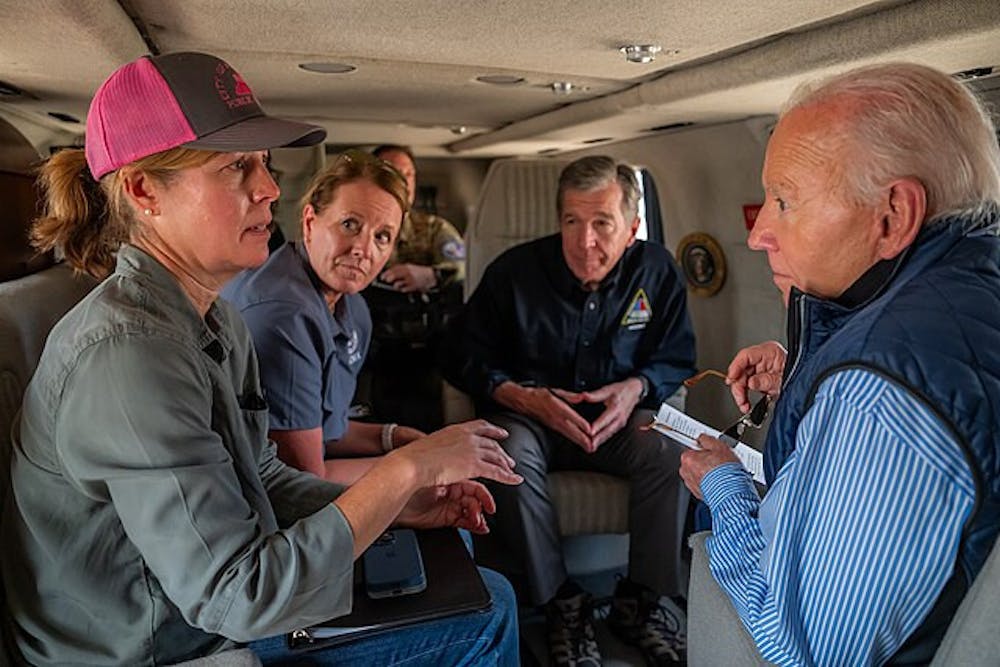North Carolina suffered “biblical devastation” from Hurricane Helene last week, with western areas of the state seeing intense flooding that put entire communities underwater.
While the full picture of destruction within the region is still being uncovered, dozens of people have been reported dead and hundreds missing in the state as of Monday.
“As the full effects of Helene become more apparent, we are united in our worry and concern for the communities across North Carolina and beyond who bore the brunt of this catastrophic storm,” President Vincent Price said in a Saturday DukeToday article. “We hold everyone harmed by this disaster in our hearts.”
Duke Athletics announced that it would hold a hurricane relief drive until Oct. 11. Community members can donate non-perishable food, bottled water, first aid and hygiene products and other items at the Duke Athletics Ticket Office in Scott Family Athletics Performance Center on 110 Whitford Dr. from 8:30 a.m. to 5 p.m. Monday through Friday.
Participants can also donate online by placing an order on the Amazon list linked on the drive’s webpage and setting the shipping destination as Duke Athletics Ticket Office Hurricane Relief. Those who donate in person are eligible for discounted tickets at select Duke Athletics events for every five items donated.
The Chronicle spoke with professors from the Nicholas School of the Environment to learn more about the status of relief efforts and what it will take to build back the impacted communities.
“Oftentimes in disasters, the limelight or media attention will be there for a week or a month, but it takes years for a community to recover after a disaster of this extent,” said Betsy Albright, Dan and Bunny Gabel chair of environmental ethics and sustainable environmental management at the Nicholas School. “It's oftentimes hard to get attention, resources, etc. down the road when the fundraisers have stopped, when the media coverage has stopped.”
The extensive damages prompted some residents of affected communities to question the response from local governments, arguing that cities could have issued more urgent warnings and brought in more emergency supplies in advance of the storm.
Though, Albright noted that it can be “hard to tell the extent of damage at this point because communities have been so closed off to people getting in and out.”
Immediate relief efforts are in full swing to support the suffering communities. Search and rescue teams from across the country and hundreds of National Guard personnel responded, providing temporary shelters and distributing emergency supplies of food and water.
However, more work is needed to ensure that those affected receive the necessary assistance.
“It's critical that communities are supported financially,” Albright said. “And second to that, it takes administrative capacity … to be able to manage those funds, allocate those funds and apply for the funds … it's hard for communities to navigate, so they need support, and they need their voices elevated.”
President Joe Biden visited western North Carolina Wednesday to observe the impact of Hurricane Helene’s rampage. In Raleigh, he announced that the federal government would pay for North Carolina’s recovery costs for six months.
“The nation has your back,” Biden said. “We’re not leaving until you’re back on your feet completely.”
Biden also said that North Carolina will be aided by 1,000 soldiers from Fort Liberty, and that additional Starlink satellites will be deployed to support communication across the state.
“The devastation was beyond belief, and even when you prepare for something like this, this is something that’s never happened before in western North Carolina,” said N.C. Gov. Roy Cooper Monday.
Martin Doyle, professor of river science and policy at the Nicholas School, challenged the approach of questioning whether communities were prepared for the disaster.
“[Western North Carolina] was prepared as most communities can be and usually are,” he said. “I think this was a truly unexpected scale and type of event.”
Doyle explained that rising global temperatures increases the amount of moisture the atmosphere can hold, providing for heavier rainfall and more intense storms.
Biden emphasized the importance of considering how climate change contributed to the hurricane’s mass destruction during his remarks in Raleigh Wednesday.
Get The Chronicle straight to your inbox
Sign up for our weekly newsletter. Cancel at any time.
“Nobody can deny the impact of the climate crisis anymore,” Biden said. “… They must be brain dead if they do.”
Doyle and Albright both emphasized the importance of promoting long-term resilience in the affected region, noting that more time is needed to gauge the storm’s full impact.
Albright highlighted potential areas of future growth beyond physical infrastructure development, emphasizing a “mix of approaches.” As examples, Albright suggested considering the locations of streams relative to buildings, updating flood maps in response to a changing climate and addressing “insurance issues.”
The Nicholas School has many scholars who focus on climate resilience in their research, and Albright pointed in particular to a Bass Connections project that aims to develop “innovative new insurance and risk management models” for climate-vulnerable communities.
“Natural disasters happen,” Doyle said. “… What we need to be resilient is the ability to adapt quickly after a disaster, not the ability to completely avoid a disaster.”

Ananya Pinnamaneni is a Trinity first-year and a staff reporter for the news department.

